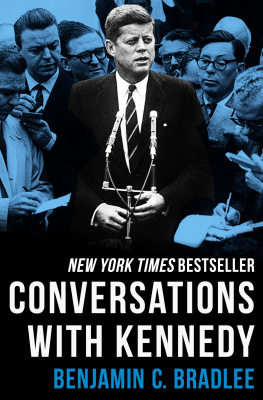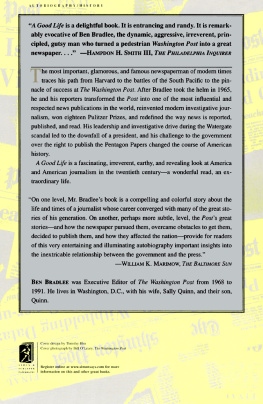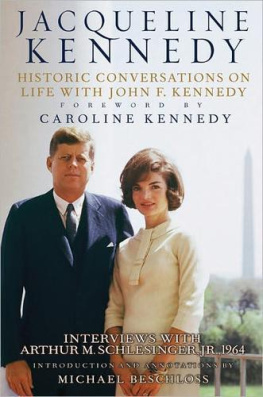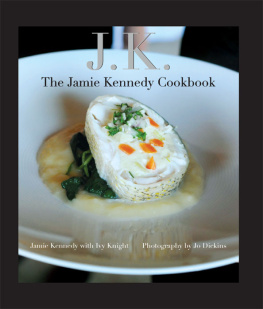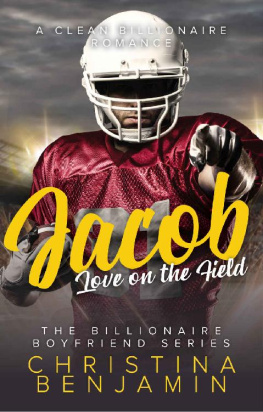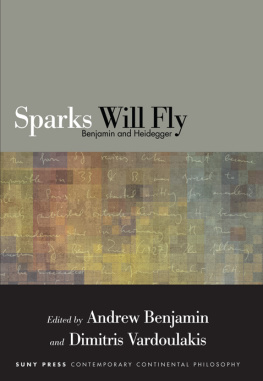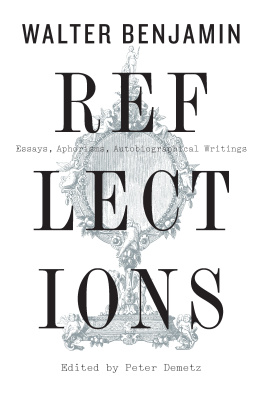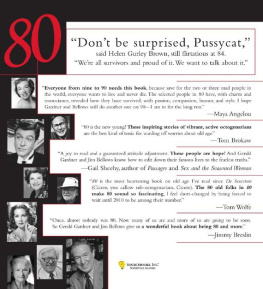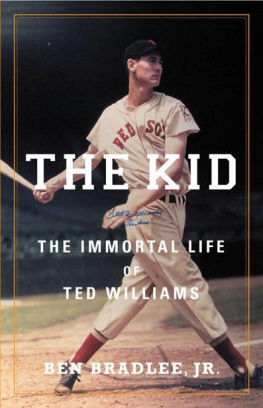Benjamin C. Bradlee - Conversations With Kennedy
Here you can read online Benjamin C. Bradlee - Conversations With Kennedy full text of the book (entire story) in english for free. Download pdf and epub, get meaning, cover and reviews about this ebook. year: 2014, publisher: Open Road Media, genre: Detective and thriller. Description of the work, (preface) as well as reviews are available. Best literature library LitArk.com created for fans of good reading and offers a wide selection of genres:
Romance novel
Science fiction
Adventure
Detective
Science
History
Home and family
Prose
Art
Politics
Computer
Non-fiction
Religion
Business
Children
Humor
Choose a favorite category and find really read worthwhile books. Enjoy immersion in the world of imagination, feel the emotions of the characters or learn something new for yourself, make an fascinating discovery.
- Book:Conversations With Kennedy
- Author:
- Publisher:Open Road Media
- Genre:
- Year:2014
- Rating:5 / 5
- Favourites:Add to favourites
- Your mark:
- 100
- 1
- 2
- 3
- 4
- 5
Conversations With Kennedy: summary, description and annotation
We offer to read an annotation, description, summary or preface (depends on what the author of the book "Conversations With Kennedy" wrote himself). If you haven't found the necessary information about the book — write in the comments, we will try to find it.
Conversations With Kennedy — read online for free the complete book (whole text) full work
Below is the text of the book, divided by pages. System saving the place of the last page read, allows you to conveniently read the book "Conversations With Kennedy" online for free, without having to search again every time where you left off. Put a bookmark, and you can go to the page where you finished reading at any time.
Font size:
Interval:
Bookmark:


Conversations with Kennedy
Benjamin C. Bradlee

For his god-child, Marina, and his friend, Dino
Introduction
T HIS IS a record of conversations I had with John F. Kennedy during the five years that I knew himbetween 1959, when he was a senator running for president, and 1963, when he died on the 1007th day of his presidency.
From the day I met himI think it was in a Senate corridor after President Eisenhowers state of the union message in January, 1959through the first year of his presidency, I kept no formal notes of these conversations. During that time I was first a political reporter in the Washington bureau of Newsweek magazine, and later its bureau chief. In those capacities, I wrote hundreds of thousands of words, many of them about Kennedy, many of them about conversations with Kennedy, many on the record, and many off the record. I have used these files to refresh my memory, in writing about conversations during this period.
But Kennedys impact on me as a person, and as a journalist lately come to the glamor of Washington, was so strongand remains so even today, fifteen years laterthat I can still quote verbatim whole chunks of conversations with him.
It is this powerful impact which accounts for the absence of a formal record of our conversations during the first years of our friendship. It happens to very few of us that some neighbor, some family friend, someone whose children play with your children (however reluctantly), becomes president of the United States. It now seems clear that when it happened to me, that friendship dominated my life, as Walter Lippmann had warned me it could. It was invaluable to me as a journalist, of course, and I used it without embarrassment to give Newsweek the intimate details of the life and thinking of this remarkable man who lit the skies of this land bright with hope and promise as no other political man has done in this century.
And even though Newsweek could run only small portions of what I was writing about President Kennedy every week, for a time those small portions satisfied my hunger to contribute to the recording of contemporary history.
But then there came a time when that hunger was no longer satisfied. There came a time when I understood that I had a unique, historical access to this fascinating man. Not the access of those who worked so closely with him and created with him the public recordthe Bundys, the Sorensens, the ODonnells, the OBriens, the McNamaras. Nor the access of those many who had known him longer and better. But the unique access of a journalist who saw him after the days work was done, who saw him relaxed and anxious for companionship and diversion, eager to interrupt his sobering duties with conversation, gossip, and laughter. And I knew enough of history to know that the fruits of this kind of access seldom make the history books, and the great men of our time are less understood as a result.
It was then that I started keeping detailed records of conversations, telephone calls, and contacts with JFK. These records were normally dictated into a machine within twenty-four hours after they took place. The nature of these contacts varied enormouslyfrom one-or two-minute telephone calls, to weekends at Palm Beach, Newport, or Camp David. Their frequency varied equallyfrom three times in four days, or five times a month, to zero times in three months. My notes of these conversations and contacts were taken with President Kennedys knowledge, and with the understanding only that they would not be published without his permission for at least five years after he left the White House. In fact, I did not look at these notes for ten years after he died.
It is stating the obvious that the sum total of all these contactssomewhere between 125 to 150 over a period of five yearsis neither numerically nor qualitatively sufficient to constitute anything like complete understanding of a vital and complicated man, who had lived so much of his life before I ever knew him. And it is equally obvious that since the setting of these contacts was predominantly social, the President Kennedy that I saw and heard in the flesh was a president off duty, a president trying to relax, a president in search of personal contact otherwise denied him by the burdens and isolation of his lonely office.
And so the portrait is necessarily personal and one dimensional, reflecting only what Kennedy said to menot what he said to othersreflecting generally what he said and did after hoursnot what he said and did when he was actually presiding over the crises and tensions of the country. And surely reflecting my personality, not the personality of someone with a different sense of values, humor, and proportion, whose conversations with Kennedy would be essentially different.
This record is sprinkled with what some will consider vulgarity. They may be shocked. Others, like Kennedy and like myself, whose vocabularies were formed in the crucible of life in the World War II Navy in the Pacific Ocean, will understand instinctively. There is nothing inherently vulgar in the legendary soldiers description of a broken-down Jeep. The fucking fuckers fucked. Surely, there is no more succinct, or even graceful, four-word description of that particular state of affairs. I never heard Kennedy tell a dirty joke, and I never saw in him the true vulgarities of contempt.
Journalism is just the first rough draft of history, the late Philip Graham once said to emphasize the reality that journalists never could know the whole truth right away. The whole truth takes too long to emerge, and it consists of too many strands for a single journalist to catch in the single sitting that daily journalism demands. This record of conversations is the whole and unchanged truthabout those conversations, but all together the conversations made up only a few, if essential, strands of the whole truth that was John Kennedy.
What makes journalism so fascinating, President Kennedy once said to me, and biography so interesting [is] the struggle to answer that single question: Whats he like?
Well, John F. Kennedy was like this at the times and places we saw each other. Eleven years ago, I described him as graceful, gay, funny, witty, teasing and teasable, forgiving, hungry, incapable of being corny, restless, interesting, interested, exuberant, blunt, profane, and loving. He was all of those and more.
His brief time in power seems to me now to have been filled more with hope and promise than performance. But the hope and the promise that he held for America were real, and they have not been approached since his death.
Seldom Seen
Forks of Capon, West Virginia
November, 1974
Gaps in the Record
T HERE ARE TWO significant gaps in this record of conversations with John F. Kennedy, one major, about thirty-six months, one minor, about three months, both important for their implications about the relations between the press and the presidency, and specifically between this reporter and that president.
Font size:
Interval:
Bookmark:
Similar books «Conversations With Kennedy»
Look at similar books to Conversations With Kennedy. We have selected literature similar in name and meaning in the hope of providing readers with more options to find new, interesting, not yet read works.
Discussion, reviews of the book Conversations With Kennedy and just readers' own opinions. Leave your comments, write what you think about the work, its meaning or the main characters. Specify what exactly you liked and what you didn't like, and why you think so.

